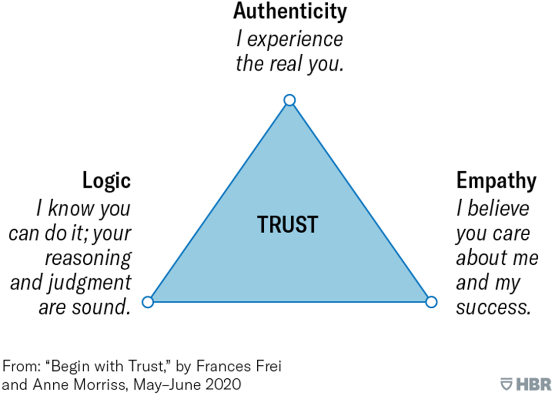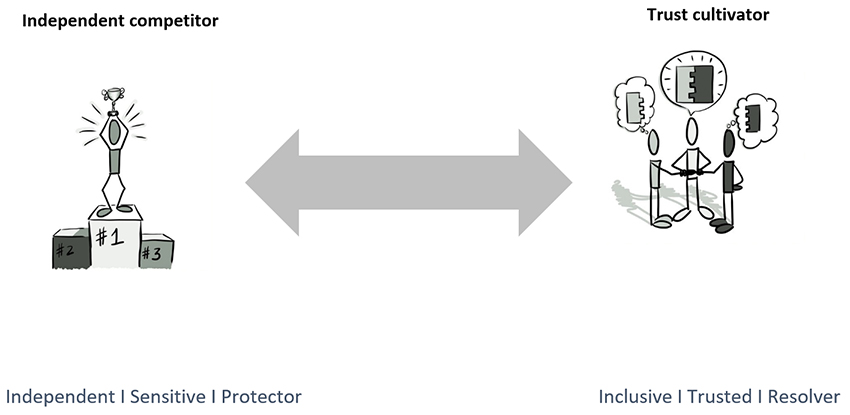Power up your collaborator
A deep dive into one of the 8 Critical Capabilities from the book PowerUp8 BY Debbie Craig
“As you navigate through the rest of your life, be open to collaboration. Other people and other people’s ideas are often better than your own. Find a group of people who challenge and inspire you, spend a lot of time with them, and it will change your life”. Amy Poehler
UNLEASHING VALUE ACROSS BOUNDARIES
The term collaboration is thrown around to get people to work together (within and across teams) more effectively to achieve common goals. Executive teams are pushed to collaborate more across their siloed functions. Customer facing units are being asked to find ways to collaborate in servicing clients in a consistent co-ordinated way. Agile teams (squads) are required to collaborate with other squads or chapters to source and build overall technical expertise. Head office centres of excellence need to work collaboratively and share resources with divisions. Lean research and development units are encouraged to engage with external start-ups or experts to accelerate innovation. Senior executives are encouraged to find ways of outsourcing or crowdsourcing parts, solutions, production or distribution. Small businesses, non-profits and community groups often need to collaborate out of necessity to deliver on bigger projects requiring skills, resources or technology outside of their own.
Collaboration is not just teamwork. It is about creating value across boundaries. Internal collaboration can be across divisional, functional, brand, team or regional boundaries. External collaboration can be crossing the boundaries of industries, businesses, expertise, communities and even competitors in a unique way or “co-opetition“ or co-operative competition. Anywhere there is an “Us and Them” perception (race, gender, politics, economics, etc) there is an opportunity to challenge some paradigms through exploring collaborative opportunities, unleashing value for all.
Over theCovid-19 pandemic period there have been many local and global examples of collaboration to save lives as doctors, researchers, engineers and scientists from all fields have worked together tirelessly to confront the outbreak with an unprecedented spirit of collaboration. Many artists, schools and organisations have collaborated virtually to produce some amazing inspirational videos, music, learning, concerts and apps to keep connected with their communities during Lock-down. With economic uncertainty and disruption around any corner, we need to be leaner and smarter with our resources and focus on our core capabilities that create true value; and then figure out how to outsource or collaborate what we are less effective or efficient at.
DISASTERS AND DERAILERS
Despite the obvious need for collaboration and many success stories, there is still an enormous amount of team dysfunction, cross-functional power dynamics, conflict and failed joint ventures. Partnerships dissolve and businesses fail, often with significant financial and personal loss. Even some of the most established companies can make basic collaborative mistakes. I have had many collaboration successes but also a number of disasters and disappointments where things fizzled out, ideas got hijacked, values conflicts got in the way or the trust was irrevocably broken. As the saying goes; Hindsight is a perfect science! I have become more discerning. I also believe that with the right values, beliefs, intent and careful communication, collaboration can be magical.
A few years ago after a particularly challenging project, I summarised the derailers of collaboration as follows:
Derailers of collaboration
Purpose: no clear purpose, motivation or reward for working together
Process: no clear process, meetings or mandates for collaborating
Power: no recognition of power dynamics and the impact of collaborative decisions on “my turf or my rewards”
Priorities: conflicting priorities between own role and committee role
People: right people being replaced with less skilled or experienced people and attitudes getting in the way
Principles: ways of working not clarified leading to assumptions and conflict
Practices: new collaborative practices not communicated or embedded effectively
According to a Harvard Business Review article, “Collaborative Overload1”, the time spent by managers and employees in collaborative activities has ballooned by 50% or more in the last two decades. Their data tells us however than up to a third of value-added collaborations come from only 3% to 5% of employees. It is often the smartest and most collaboratively minded that we want on our projects. Unfortunately, so does everyone else which leads to overload and “institutional bottlenecks”. It turns out that 60% of employees want to spend less time responding to ad hoc collaboration requests and just focus on their own deliverables.
“If you want to go fast, go alone. If you want to go far, go together.” African Proverb
WHAT’S TRUST GOT TO DO WITH IT?
Trust is the most critical element to being an effective collaborator. It can be hard to see how trustworthy we appear to others. It is easier to criticise the actions of others. Francis Frei a Harvard Business School Professor who consulted at Uber at the height of their struggles, shares the 3 drivers of trust in her YouTube video: “How to build (and rebuild) trust2”. They are authenticity, logic, and empathy. Authenticity comes across as experiencing the real you (not telling me what I want to or need to hear). Empathy is present when I believe you care about me and my success (not just yours or the company). Logic is knowing that you can do it (confidence) and that your reasoning and judgement is sound (credibility in making decisions). She says that when trust is lost, it can almost always be traced back to a breakdown in one of these three and that most of us will have a “wobble” in at least one of them. How are you doing with trust (and maybe ask for outside perspectives)?

DOES IT COME NATURALLY?
There are times to compete and there are times to build trust and collaborate when the potential gain from working together is greater than the individual gain. How flexible are you and how easily can you adapt your approach when the need arises? How much time are your spending building your Independent competitor muscle vs your Trust cultivator skills, and how is this impacting your choices and opportunities in life.

Trust cultivators are Inclusive, Trusting, Resolvers
They believe in the power of group work and synergy, in the exchange of energy through sharing and learning together and in growing the pie, not fighting over it. They know the power of trust to speed things up and see constructive disagreement as part of the journey. They value ideas and inputs from others. They generally feel positive, optimistic, appreciative, trusting and inclusive. They use language like let’s do this, imagine the possibilities, what is the win-win here, together we can do more. They have daily habits like sharing knowledge freely, connecting across boundaries, smoothing the waters, taking time to have the important conversations and clarifying ways of work to achieve a common goal.
Independent competitors are Independent, Sensitive, Protectors
They believe that teamwork is messy and that they should be in control of their own time and energy. They believe they must protect their legacy, keep their cards close to their chest and rather not risk trusting anyone without evidence as most people are in it for themselves. They can tend to feel superior, suspicious, defensive, nervous and isolated .. especially when the going gets tough. They use language like: “It’s quicker and easier to do it myself, it’s not my problem, I told them so, what is the hidden agenda here.” They have daily habits like protecting their ideas, holding back information, seeking recognition, refusing requests for meetings or avoiding input from others.
DAILY HACKS AND HABITS FOR COLLABORATION
Trust Cultivators have daily habits that build trust in self, and trust with and through others for a greater collaborative outcome. Some of our favourites are outlined below with many more are in the PowerUp8 book.
Habit #1: Cross-boundaries
There are many ways to cross boundaries inside and outside of your organization. Set up or request to join a cross-boundary team. Invite people from diverse functions or industries to a brainstorming meeting. Spend a few hours visiting another department or company. Speak to young, new or different people to hear different ideas and perspectives. Get everyone to focus on the bigger picture of collaborating and sharing together.
Habit #2: Collaborative Attitude
Collaboration doesn’t work without collaborativemindsets and skills. Communicate, share, be brave, have a generous, abundance mindset, let go the need to be in control. Recognize that trusting others starts with trusting yourself i.e. tuning in to your inner voice, listening to your intuition, trusting your gut and ultimately having a healthy trust in life itself.
Habit #3: Collaborative learning
You can significantly accelerate your own learning through cross-boundary or collaborative learning and networking. Initiate a learning circle or community of practice to share learning on a specific topic. Connect with someone who can be your learning or accountability partner. Identify someone you have met recently in hour network that you can learn from and initiate a chat.Host a design thinking session to imagine an alternative future.
Habit #4: Practice collaborative principles
Set up and facilitate meetings using some collaboration principles and tools.
- Divergence: Take a few mins to move away from task focused work and allow some free flow of ideas without constraint.
- Foolish Fun: Step into the archetype of The Fool, or the Court Jester – open, curious, unafraid to look silly or have a beginner’s mind.
- Freedom to Fail: Start a meeting with an open permission to fail or there is no right and wrong.
- Spirit of Yes And: instead of Yes BUT builds on ideas rather than destroys confidence.
Habit #5: Experiment with collaboration tools
Experiment to find the best fit to enhance collaboration in and across teams. Keep up to date with emerging options and apps. Keep it simple with social media pages and forums or whatsapp/signal/telegram groups. Or take it further with tech such as MS Teams, Slack, Mural, Miro, Trello, Monday, Google Docs, Yammer, Asana and many others.
TIPS, TOOLS AND RESOURCES
We have listed a few TRUST CULTIVATOR resources below and many more are in the PowerUp8 book.
Articles / Blogs
Harvard Business Review, Collaborative Overload, by Cross, Rebele, Grant, Jan-Feb 2016
Books
The SPEED of Trust: The One Thing that Changes Everything, Stephen M.R. Covey; Free Press, 2006, 2018
Videos
How to build (and rebuild) trust | Frances Frei
Building a psychologically safe workplace | Amy Edmondson | TEDxHGSE
Tools
Free trustworthiness assessment
- Rebele, R. Grant, A. (2016). ‘Collaborative Overload’. Harvard Business Review. Available at https://hbr.org/2016/01/collaborative-overload.
- Ted. (2018). How to build (and rebuild) trust | Frances Frei. https://www.youtube.com/watch?v=pVeq-0dIqpk&t=20s.











